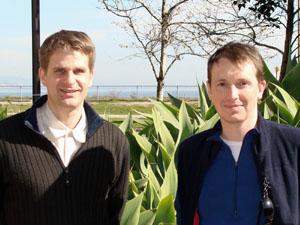Professors Hollerer and van Dam receive NSF CAREER Awards

Two young faculty members, Wim van Dam and Tobias Hollerer, both received the 2007 National Science Foundation Early Career Development (CAREER) award. CAREER awards, given to future academic leaders, are the foundation’s most prestigious grants for young teacher-scholars. The awards each provide support for research in the amount of half a million dollars over a five-year period.
Prof. van Dam’s award is titled “Algebraic and Semiclassical Methods for Quantum Computing” and the project it funds analyzes the power and limitations of quantum computers using new techniques from algebraic geometry and the physics of semi-classical systems. Whether it will be worthwhile to develop a quantum computer depends largely on the expected computational benefits of such a machine, but our current understanding of this issue is still very limited. Van Dam’s research investigates the differences between classical and quantum computers by rephrasing their properties into the language of algebraic geometry, such that one can compare their –more intuitive– geometric characteristics.
Prof. Hollerer’s award is titled “Anywhere Augmentation: Practical Mobile Augmented Reality in Unprepared Physical Environments.” Anywhere Augmentation refers to the idea of linking location-specific computing services with the physical world, making them readily and directly available in any situation and location. Anywhere Augmentation constitutes a powerful interface for wearable computing. If computer users are enabled to place arbitrary annotations in 3D space, wherever they go, the physical world becomes the user interface. The proposal pursues novel interaction techniques based on efficient human input through both sketch-based interfaces on hand-held devices and direct-overlay 3D user interfaces using near-eye displays.